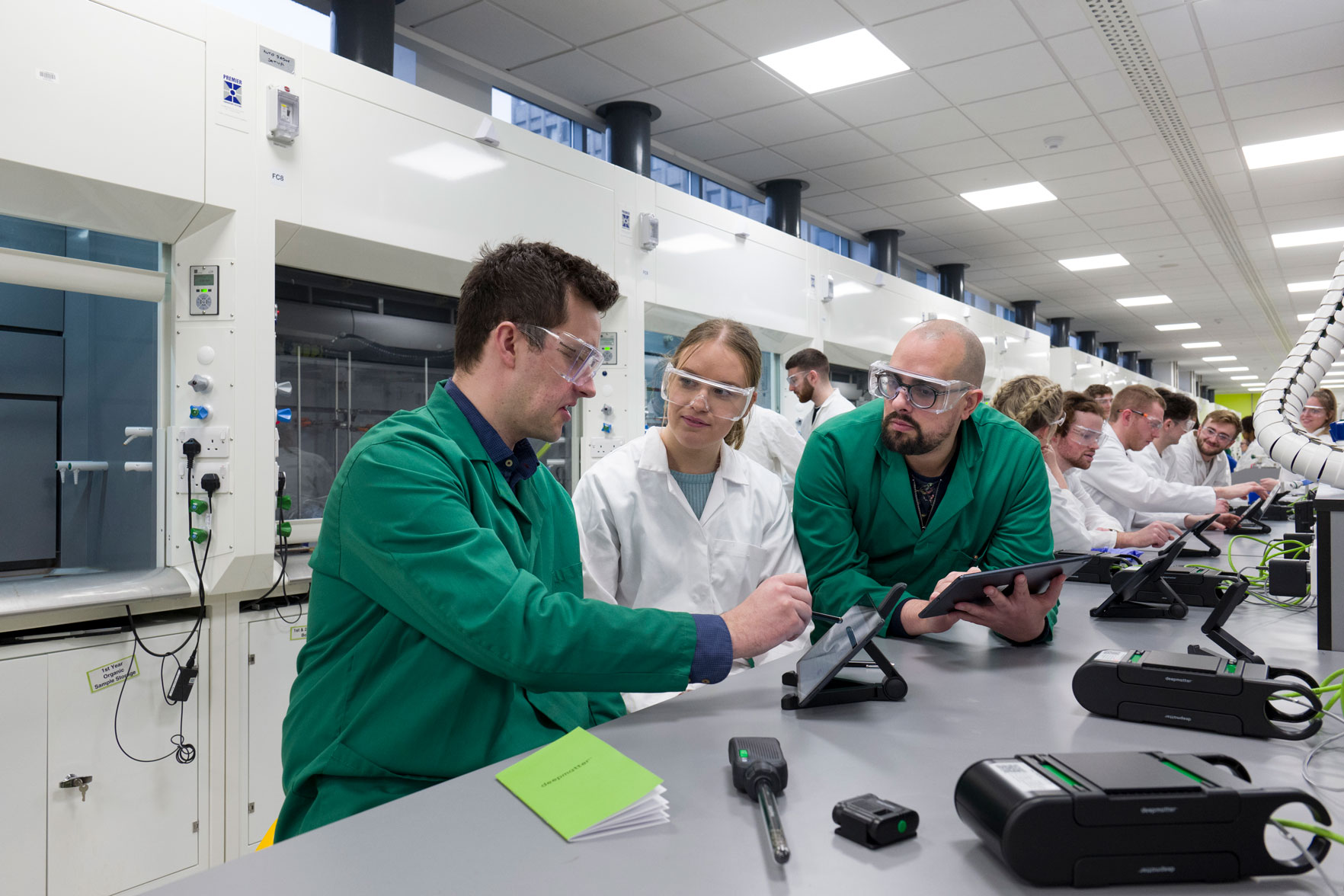Thursday, 20 February 2020
Chemistry students at the University of Nottingham are amongst the first to trial an innovative new digital system for recording, sharing and reproducing research in the lab.
The University of Nottingham’s School of Chemistry is collaborating with DeepMatter, a company focusing on digitising chemistry, to explore the benefits of the DigitalGlassware™ platform in data capture and analysis within undergraduate chemistry teaching.
The project, “'Data led synthesis: an undergraduate project in chemical optimisation" will see undergraduate students performing a series of chemical reactions within DigitalGlassware™ over the course of four weeks. DigitalGlassware™ is an integrated software, hardware and artificial intelligence enabled platform, which allows chemistry experiments to be accurately and systematically recorded, coded and entered into a shared data cloud. The aim of DigitalGlassware™ is to bring recordability, reproducibility and shareability to the lab, enabling chemists to produce better molecules, faster and ultimately cheaper.
The University of Nottingham’s School of Chemistry uses a fully Digital Teaching Laboratory, a completely paperless setting. The use of DigitalGlassware™ aims to significantly increase the reproducibility of experiments, which is key to an increasingly digital environment. The Digital Teaching Laboratory is part of the University of Nottingham’s HEFCE funded STEM Teaching Laboratory that is fully equipped with cutting-edge facilities used for research and teaching. The laboratory offers students an outstanding learning experience in practical chemistry combined with the latest digital technologies for integrated working.
Andrew Nortcliffe, Assistant Professor of Medicinal Chemistry at the University of Nottingham is supervising the students using the new system, he said: “Data led approaches to chemical research are starting to become more prevalent in industry, turning to digital solutions to increase accuracy, efficiency and reproducibility of chemical reactions. But in the chemistry teaching lab there remains a disparity between practical work and how capturing data can refine and improve outcomes."
Mark Warne, CEO of DeepMatter Group, commented: “We are delighted that Nottingham’s chemists of the future will have access to our innovative cloud-based platform, DigitalGlassware™, supporting the University’s drive towards the digitisation of chemistry and introducing the students early to digital tools. With the reproducibility crisis in chemistry estimated to have an annual financial impact of $28bn in the US alone, and currently 50% of science being deemed irreproducible, digital platforms have the potential to transform the chemistry industry in the years ahead. We hope that these students will become advocates for greater use of digital as they enter the industry.”

At the University of Nottingham, we are emphasising to our students the importance of capturing and analysing data. DigitalGlassware™ is a natural fit in our teaching labs as it exposes data led approaches to our students in a meaningful way, preparing them better for their future chemical careers.
Story credits
More information on the research is available from Andrew Nortcliffe at the University of Nottingham on andrew.nortcliffe@nottingham.ac.uk or Jane Icke Media Relations Manager for the Faculty of Science at the University of Nottingham, on +44 (0)115 951 5751 jane.icke@nottingham.ac.uk .
Notes to editors:
About the University of Nottingham
Ranked 97 in the world and 17th in the UK by the QS World University Rankings, the University of Nottingham is a founding member of Russell Group of research-intensive universities. Studying at the University of Nottingham is a life-changing experience, and we pride ourselves on unlocking the potential of our students. We have a pioneering spirit, expressed in the vision of our founder Sir Jesse Boot, which has seen us lead the way in establishing campuses in China and Malaysia - part of a globally connected network of education, research and industrial engagement.
Nottingham was crowned Sports University of the Year by The Times and Sunday Times Good University Guide 2024 – the third time it has been given the honour since 2018 – and by the Daily Mail University Guide 2024.
The university is among the best universities in the UK for the strength of our research, positioned seventh for research power in the UK according to REF 2021. The birthplace of discoveries such as MRI and ibuprofen, our innovations transform lives and tackle global problems such as sustainable food supplies, ending modern slavery, developing greener transport, and reducing reliance on fossil fuels.
The university is a major employer and industry partner - locally and globally - and our graduates are the third most targeted by the UK's top employers, according to The Graduate Market in 2024 report by High Fliers Research. Alongside Nottingham Trent University, we lead the Universities for Nottingham initiative, a pioneering collaboration between the city’s two world-class institutions to improve levels of prosperity, opportunity, sustainability, health and wellbeing for residents in the city and region we are proud to call home. More news…